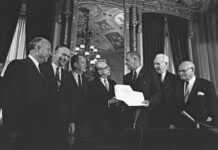![]()
![]()
![]()
![]()
![]()
![]()
 By: Charles Blatcher, III
By: Charles Blatcher, III
Chairman, National Coalition of Black Veteran Organizations
Slavery and Jim Crow were the “Laws of the Land” for over two centuries. White colonist classified Blacks as three-fifths a person. The classification justified their denial of Human Rights to Blacks held in bondage. In 1954 the doctrine “Separate but Equal” fell in the Supreme Court case Brown vs the Topeka, Kansas Board of Education. The ruling outlawed segregation and brought about some important changes in race relations. However, the passage of the law did not dissipate the distrust and hatred cultivated through policies and practices over the centuries. The period of slavery represents the lowest level of moral destitute in American History. The inhumanities of the slave trade industry should never be forgotten.
The perils of race relations lies in our inability to reconcile the past and present inequities, leaving the future in doubt. People often avoid the discussion of race except among their like-kind. Among peoples of different races the subject can be emotionally uncomfortable. However, we cannot move forward in race relations until the grievances of the past are properly recognized and reconciled. The need for that discussion is well overdue. It is a discussion that should have taken place around the development of the National African American Museum in Washington, DC. It was the opportunity to have the public discussion while fulfilling the basic functions of the institution to raise public awareness and teach. Quoting former President Barack Obama, “It was a teachable moment” in American History.
America has been less than half – hearted about race relations and racial justice. As our Native American Brothers and Sisters would say, “America speaks with a fork tongue.” Our Government says one thing and do something else. For examples, the Voting Rights Act of 1965 gave Black Americans the right to vote, although the law must be ratified on occasion to extend the right. There is no such ratification required for White Americans right to vote. We could talk about the disproportionate number of Black men incarcerated in the nation’s penal system. With a felony conviction in many states the individuals lose their right to vote. Along with Republican gerrymandering the Black vote is being marginalized.
There are numerous examples that could be given. We could talk about the police killing of unarmed Black men with impunity; a failing public education system in urban cities; or American symbolism? Take a ride through our nation’s capital and see the boulevards featuring impressive statues honoring war heroes, Soldiers on horseback. How many feature Black Soldiers? In cities located primarily in the South they have statues honoring Confederate Soldiers who committed treason against the nation. There are eleven military installations named to honor Confederate Soldiers. Among the common bonds between these men were their desire to protect the institution of slavery. What message does that send to American society and the World by honoring these men? Especially, when there is NOT ONE US Army Base named to honor an African American Soldier. There are Black servicemen and servicewomen in American History worthy of the honor.
When America is ready to have a serious conversation on race relations let it begin by recognizing Black Americans unquestionable right to vote; remove the statues and change the names of the military installations that honor Confederate Soldiers. Celebrate people of honorable character, the true American Heroes. Let the legendary Buffalo Soldier, Educator and Diplomat – Colonel Charles Young be among those honored. America have yet to learn that we can only move forward in a positive relationship when we acknowledge and reconcile the major differences of our past.






